- Home
- Daniel Quinn
Beyond Civilization: Humanity's Next Great Adventure
Beyond Civilization: Humanity's Next Great Adventure Read online
Other Books by Daniel Quinn
Ishmael
My Ishmael: A Sequel
The Story of B
Providence: The Story of a Fifty-Year Vision Quest
For Rennie
and for Hap Veerkamp and C.J. Harper,
with special thanks to the members of the 1998 Houston Seminar,
who played such a crucial role in the development of this book,
and to Scott Valentine and Sara Walsh in particular—
you kept us going and you kept me sane.
The homeless and the young are rapidly converging on the
socioeconomic territory I identify in this book as “beyond
civilization.” The homeless have for the most part been thrust
into it involuntarily, while many of the young unknowingly
yearn for it, as anyone does who wants more from life than
just a chance to feed at the trough where the world is
being devoured. It is to them and their hopes that
this book is particularly dedicated.
PART ONE
Closing In on the Problem
I heard this, naturally, from my grandfather, he from his grandfather, he from his own grandfather, and so on, back many hundreds of years. That means this tale is very old. But it won't disappear, because I offer it to my children, and my children will tell it to their children, and so on.
GYPSY STORYTELLER LAZAROS HARISIADIS, QUOTED BY DIANE TONG IN GYPSY FOLK TALES
A fable to start with
Once upon a time life evolved on a certain planet, bringing forth many different social organizations—packs, pods, flocks, troops, herds, and so on. One species whose members were unusually intelligent developed a unique social organization called a tribe. Tribalism worked well for them for millions of years, but there came a time when they decided to experiment with a new social organization (called civilization) that was hierarchal rather than tribal. Before long, those at the top of the hierarchy were living in great luxury, enjoying perfect leisure and having the best of everything. A larger class of people below them lived very well and had nothing to complain about. But the masses living at the bottom of the hierarchy didn't like it at all. They worked and lived like pack animals, struggling just to stay alive.
“This isn't working,” the masses said. “The tribal way was better. We should return to that way.” But the ruler of the hierarchy told them, “We've put that primitive life behind us forever. We can't go back to it.”
“If we can't go back,” the masses said, “then let's go forward—on to something different.”
“That can't be done,” the ruler said, “because nothing different is possible. Nothing can be beyond civilization. Civilization is a final, unsurpassable invention.”
“But no invention is ever unsurpassable. The steam engine was surpassed by the gas engine. The radio was surpassed by television. The calculator was surpassed by the computer. Why should civilization be different?”
“I don't know why it's different,” the ruler said, “It just is. ”
But the masses didn't believe this—and neither do I.
A Manual of Change
My first concept of this book was reflected in its original title: The Manual of Change. I thought of this because there's nothing the people of our culture want more than change. They desperately want to change themselves and the world around them. The reason isn't hard to find. They know something's wrong— wrong with themselves and wrong with the world.
In Ishmael and my other books, I gave people a new way of understanding what's gone wrong here. I had the rather naive idea this would be enough. Usually it is enough. If you know what's wrong with something—your car or your computer or your refrigerator or your television set—then the rest is relatively easy. I assumed it would be the same here, but of course it isn't. Over and over again, literally thousands of times, people have said to me or written to me, “I understand what you're saying—you've changed the way I see the world and our place in it—but what are we supposed to DO about it?”
I might have said, “Isn't it obvious?” But obviously it isn't obvious—or anything remotely like obvious.
In this book I hope to make it obvious.
Humanity's future is what's at stake.
Who are the people of “our culture”?
It's easy to pick out the people who belong to “our” culture. If you go somewhere—anywhere in the world—where the food is under lock and key, you'll know you're among people of our culture. They may differ wildly in relatively superficial matters—in the way they dress, in their marriage customs, in the holidays they observe, and so on. But when it comes to the most fundamental thing of all, getting the food they need to stay alive, they're all alike. In these places, the food is all owned by someone, and if you want some, you'll have to buy it. This is expected in these places; the people of our culture know no other way.
Making food a commodity to be owned was one of the great innovations of our culture. No other culture in history has ever put food under lock and key—and putting it there is the cornerstone of our economy, for if the food wasn't under lock and key, who would work?
What does “saving the world” mean?
When we talk about saving the world, what world are we talking about? Not the globe itself, obviously. But also not the biological world—the world of life. The world of life, strangely enough, is not in danger (though thousands and perhaps even millions of species are). Even at our worst and most destructive, we would be unable to render this planet lifeless. At present it's estimated that as many as two hundred species a day are becoming extinct, thanks to us. If we continue to kill off our neighbors at this rate, there will inevitably come a day when one of those two hundred species is our own.
Saving the world also can't mean preserving the world as it is right now. That may sound like a nice idea, but it's also out of reach. Even if the entire human race vanished tomorrow, the world wouldn't stay the way it is today. We will never, under any circumstances, be able to stop change on this planet.
But if saving the world doesn't mean saving the world of life or preserving it unchanged, what are we talking about? Saving the world can only mean one thing: saving the world as a human habitat. Accomplishing this will mean (must mean) saving the world as a habitat for as many other species as possible. We can only save the world as a human habitat if we stop our catastrophic onslaught on the community of life, for we depend on that community for our very lives.
Old minds with new programs
In my novel The Story of B, the middle volume of the trilogy that begins with Ishmael and ends with My Ishmael, I wrote, “If the world is saved, it will not be by old minds with new programs but by new minds with no programs at all.” I'm afraid this is a case where the words are all easy, but the thoughts are slippery. I'll rephrase it. If we go on as we are, we're not going to be around for much longer—a few decades, a century at most. If we're still around a thousand years from now, it will be because we stopped going on as we are.
How will that have come about? How are we going to stop going on this way?
Here's how old minds think of stopping us. They think of stopping us the way they stopped poverty, the way they stopped drug abuse, the way they stopped crime. With programs. Programs are sticks planted in the mud of a river to impede its flow. The sticks do impede the flow. A little. But they never stop the flow, and they never turn the river aside.
This is why I can confidently predict that if the world is saved, it will not be because some old minds came up with some new programs. Programs never stop the things they
're launched to stop. No program has ever stopped poverty, drug abuse, or crime, and no program ever will stop them.
And no program will ever stop us from devastating the world.
New minds with no programs
If the world is saved, it will not be by old minds with new programs but by new minds with no programs at all.
Why not new minds with new programs? Because where you find people working on programs, you don't find new minds, you find old ones. Programs and old minds go together like buggy whips and buggies.
The river I mentioned earlier is the river of vision. Our culture's river of vision is carrying us toward catastrophe. Sticks planted in the mud may impede the flow of the river, but we don't need to impede its flow, we need to divert it into an entirely new channel. If our culture's river of vision ever begins to carry us away from catastrophe and into a sustainable future, then programs will be superfluous. When the river's flowing where you want it to flow, you don't plant sticks to impede it.
No programs at all?
Programs make it possible to look busy and purposeful while failing. If programs actually did the things people expect them to do, then human society would be heaven: our governments would work, our schools would work, our law enforcement systems would work, our justice systems would work, our penal systems would work, and so on.
When programs fail (as they invariably do), this is blamed on things like poor design, lack of funds and staff, bad management, and inadequate training. When programs fail, look for them to be replaced by new ones with improved design, increased funding and staff, superior management, and better training. When these new programs fail (as they invariably do), this is blamed on poor design, lack of funds and staff, bad management, and inadequate training.
This is why we spend more and more on our failures every year. Most people accept this willingly enough, because they know they're getting more every year: bigger budgets, more laws, more police, more prisons—more of everything that didn't work last year or the year before that or the year before that.
If not programs, then what?
A man was found sitting in the middle of the desert in a contraption made of rocks, bits of lumber, and old, blown tires, which he was busily “steering” as if it were actually a vehicle in motion.
Asked what he was doing, the man said, “Driving home.”
“You're never going to get there in this,” he was told.
He said, “If not in this, then in what?”
We're like this man, busily trying to steer into the future in a Rube Goldberg assemblage of programs that has never taken us any farther than this man's pile of junk took him. Even after we've acknowledged that programs don't work and never have worked, however, it still somehow seems natural to ask, “If not programs, then what?”
I'd like to recast the question this way: “If programs don't work, then what does work?” In fact, I have an even better way of asking the question: “What works so well that programs are superfluous? What works so well that it never occurs to anyone to create programs to make it work?”
The answer to all these questions is: vision.
The invisibility of success
When things work, the forces that make them work are invisible. The universe at large is a notorious example of this. It took a towering genius to recognize the laws of motion and universal gravitation that now seem almost boringly obvious to us. Newton's genius was precisely the genius of seeing that which is so evident as to be unseeable. Every advance in science makes manifest a working that is cloaked by its very success.
The dancer's admonition is Never let them see you sweat. When it comes to the laws of the universe, this admonition becomes Never let them see you at all: make them deduce your existence. And indeed the laws of the universe are never directly observable, so we have no other way of discovering them except by deduction.
What works in the living community is similarly cloaked by its success. The basic laws of ecology have the beauty and simplicity of a fairy tale, but their existence only began to be suspected a century ago.
The invisibility of tribal success
People are fascinated to learn why a pride of lions works, why a troop of baboons works, or why a flock of geese works, but they often resist learning why a tribe of humans works. Tribal humans were successful on this planet for three million years before our agricultural revolution, and they're no less successful today wherever they manage to survive untouched, but many people of our culture don't want to hear about it. In fact, they'll vigorously deny it. If you explain to them why a herd of elephants works or why a hive of bees works, they have no problem. But if you try to explain why a tribe of humans works, they accuse you of “idealizing” them. From the point of view of ethology or evolutionary biology, however, the success of humans in tribes is no more an idealization than the success of bison in herds or whales in pods.
Our cultural excuse for failure is that humans are just “naturally” flawed—greedy, selfish, short-sighted, violent, and so on, which means anything you do with them will fail. In order to validate that excuse, people want tribalism to be a failure. For this reason, to people who want to uphold our cultural mythology, any suggestion that tribalism was successful is perceived as a threat.
Making tribal success visible is the work of my other books and will not be repeated here.
Conspicuous success, invisible source
Our culture has been conspicuously successful, in the sense that it has overrun the world. For most of our history, this success was perceived as merely an inevitability, the working out of human destiny. People no more wondered about it than they wondered about gravity. When Europeans “discovered” the New World, they considered it a sacred duty to take it over. The people who were already living there were just in the way, like trees or rocks or wild animals. They had no real business being there, as we did. For us to take over this hemisphere was just part of the larger plan (presumably God's plan) for us to take over the entire world.
That we were able to overrun this hemisphere (and indeed the entire world) came as no surprise to us. This is simply what was meant to be, so naturally it came to be. No one is amazed when clouds produce rain.
Before Newton, people didn't wonder why unsupported objects are compelled to fall to the ground. They just figured, what else could they do? They have to fall to the ground, and that's that. Our historians have always been in the same condition when it comes to our tremendous cultural success. They don't wonder why we were compelled to take over the world. They just figure, what else could we have done? We had to take over the world, and that's that.
Vision is like gravity
Vision is to culture what gravity is to matter. When you see a ball roll off a table and fall to the floor, you should think, “Gravity is at work here.” When you see a culture make its appearance and spread outward in all directions until it takes over the entire world, you should think, “Vision is at work here.”
When you see a small group of people begin behaving in a special way that subsequently spreads across an entire continent, you should think, “Vision is at work here.” If I tell you that the small group I have in mind were followers of a first-century preacher named Paul and that the continent was Europe, you'll know the vision was Christianity.
Dozens or perhaps even hundreds of books have investigated the reasons for Christianity's success, but not one of them was written before the nineteenth century. Before the nineteenth century it seemed to everyone that Christianity no more needed reasons to succeed than gravity does. It was bound to succeed. Its success was sponsored by destiny.
For exactly the same reason, no one has ever written a book investigating the reasons for the success of the Industrial Revolution. It's perfectly obvious to us that the Industrial Revolution was bound to succeed. It could no more have failed than a ball rolling off a table could fall toward the ceiling.
That's the power of vision.
The spread of vision
Our culture's spreading mechanism was population expansion: Grow, then get more land, increase food production, and grow some more. Christianity's spreading mechanism was conversion: Accept Jesus, then get others to accept him. The Industrial Revolution's spreading mechanism was improvement: Improve on something, then put it out there for others to improve on.
Clearly all spreading mechanisms have one thing in common: they confer benefits on those who do the spreading. Those who get more land, increase food production, and grow are rewarded with riches and power. Those who accept Jesus and get others to accept him are rewarded with heaven. Those who improve on something and put it out there for others to improve on are rewarded with respect, fame, and wealth. The benefit conferred shouldn't, however, be confused with the mechanism itself. Our culture wasn't spread by people becoming rich and powerful, Christianity wasn't spread by people going to heaven, and the Industrial Revolution wasn't spread by people winning respect, fame, and wealth.
Vision: success without programs
When a chemist puts water in a test tube and adds salt, an angel comes along and dissolves the salt into charged particles called ions. Because we perceive the universe to be self-governing according to internally consistent and comprehensible principles, the angel in this story seems completely superfluous to us. We therefore cut it away with Occam's razor.
Although historians now look for the reasons behind Christianity's success, they aren't looking for programs. Christianity thrived in the Roman world because the people of that time were ready for it, and historians would no more expect to find programs at work there “promoting” Christianity than chemists would expect to find angels at work in their test tubes. (It might be argued that Constantine's Edict of Milan, allowing Christians freedom of worship, was a program of support, but in fact it merely permitted what two and a half centuries of persecution had been unable to stop, much as the twenty-first amendment to the U.S. Constitution merely permitted what fourteen years of Prohibition had been unable to stop.)

 The Story of B
The Story of B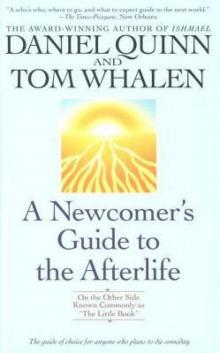 A Newcomer's Guide to the Afterlife: On the Other Side Known Commonly as the Little Book
A Newcomer's Guide to the Afterlife: On the Other Side Known Commonly as the Little Book Ishmael: An Adventure of the Mind and Spirit
Ishmael: An Adventure of the Mind and Spirit CLONES: The Anthology
CLONES: The Anthology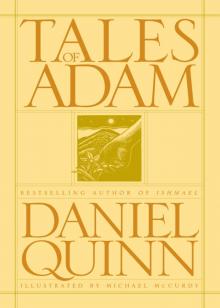 Tales of Adam
Tales of Adam The Holy
The Holy Dreamer
Dreamer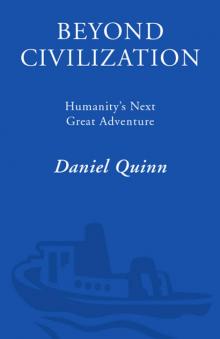 Beyond Civilization: Humanity's Next Great Adventure
Beyond Civilization: Humanity's Next Great Adventure After Dachau
After Dachau If They Give You Lined Paper, Write Sideways.
If They Give You Lined Paper, Write Sideways.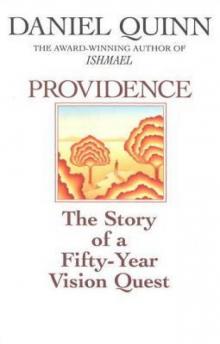 Providence
Providence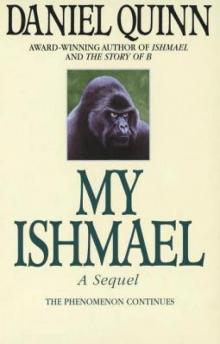 My Ishmael
My Ishmael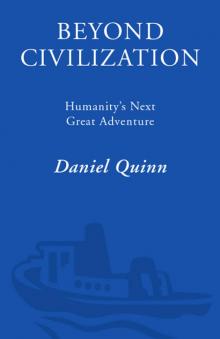 Beyond Civilization
Beyond Civilization If They Give You Lined Paper, Write Sideways
If They Give You Lined Paper, Write Sideways Ishmael
Ishmael Ishmael i-1
Ishmael i-1 A Newcomer's Guide to the Afterlife
A Newcomer's Guide to the Afterlife